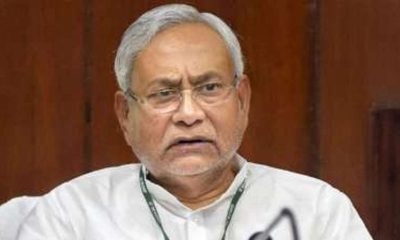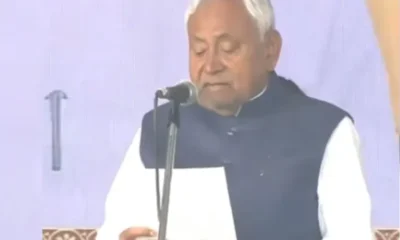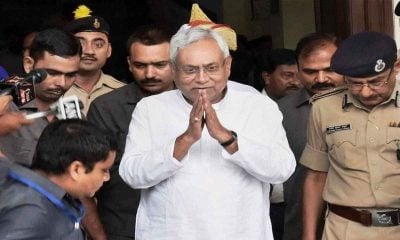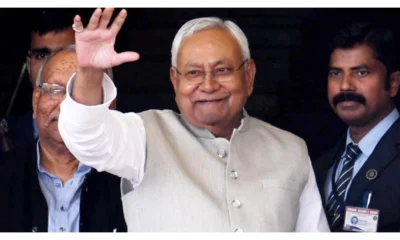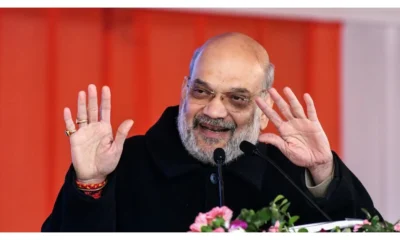[vc_row][vc_column][vc_column_text]The Election Commission on Nov 17 (Friday) ruled that the group led by Bihar Chief Minister Nitish Kumar is the real Janata Dal (United) and is entitled to use the ‘Arrow’ symbol of the party.
Dismissing the petition filed by JD(U) MLA from Gujarat and Sharad Yadav supporter Chhotubhai Amarsang Vasava, the EC said the group led by Nitish “has demonstrated overwhelming support in the legislature wing as well as the majority in the national council of the party, which is the apex level organisation body of the party”.
The JD(U) leaders Sharad Yadav and Bihar CM Nitish Kumar had fallen apart after Kumar decided to end alliance with Lalu Prasad’s RJD and the Congress to join hands with the BJP. Yadav accused him of indulging in anti-party activities by going against the decision of the national executive of the party which had resolved to oppose the BJP.
Yadav maintained that the real JD(U) remained with him. JD(U) working president Chhotubhai Amarsang Vasava, who is in his camp, moved the poll panel staking claim over the party and its election symbol. In their petition, the Sharad Yadav group urged EC to recognise their group as the real JD(U) under Paragraph 15 of the Elections Symbols (Reservation & Allotment) order, 1968.
The EC had received communications from both the JD(U) factions stating that they intended to contest the Gujarat election and sought commission’s approval for allotment of ‘arrow’ symbol for their candidates during the polls.
“Therefore there is an urgency for the Commission to pronounce the decision as to which of the two groups is JD(U),” said the EC while passing the order..
Vasava in his petition claimed he had been elected as acting president of JD(U) on September 17, 2017, in a meeting of the party national executive until the election of a new president in accordance of the constitution of the party.
He said the dispute within the party had arisen when Nitish Kumar decided to break JD(U)’s ‘mahagathbandhan’ with RJD-Congress and align with the BJP, “against the principles of the party and earlier decision taken by the party”.
Both Sharad Yadav group and Nitish-led group submitted their written submissions to EC, along with individual affidavits from members of the legislative wings of the party and members of the national council of the party constituted in 2013.
The petitioner, Vasava’s counsel said his client had submitted affidavits of 450 persons out of 1,098 members of the national council.
Vasava’s papers further claimed that his group commanded the support of two out of 10 Rajya Sabha MPs from Gujarat and one MLC of Maharashtra. Incidentally, the Maharashtra MLC – Kapil Harishchandra Patel – has also filed an affidavit of support to the other JD(U) faction as well.
The Nitish group contended that the present strength of the JD(U) national council was 195, with organisational elections held in October last. The information regarding the organisational elections was uploaded on EC’s website. Moreover, the group submitted affidavits from 138 of the 195 elected members, 2 Lok Sabha MPs and 7 of 10 Rajya Sabha MPs, 71 MLAs from Bihar and all 30 MLCs backing Nitish as the leader.
The Commission, after hearing the oral and written submissions of both factions, said the Supreme Court’s verdict on Sadiq Ali Vs ECI could be applied in the instant case and added that Nitish Kumar had demonstrated overwhelming majority support in the legislature wing as well as the majority in the national council of the party. “Accordingly, JD(U) is hereby recognised as the Janata Dal (United) in terms of Paragraph-‘l5 of the Symbols Order. Consequently, the group led by Nitish Kumar is entitled to use the reserved symbol ‘Arrow’ of the party as a recognised State Party in Bihar,” the order read.[/vc_column_text][/vc_column][/vc_row]


